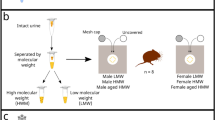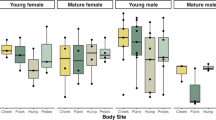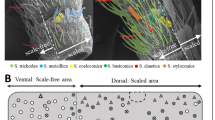Abstract
BLACKTAILED deer (Odocoileus hemionus columbianus) of the Pacific Coast of North America sniff and lick each other's scent-carrying tarsal organ in various social situations1,2. Tarsal scent, a mixture of odoriferous compounds2, is important in individual recognition. The tarsal organ consists of a scent gland and a hair tuft carrying the scent in its centre.
This is a preview of subscription content, access via your institution
Access options
Similar content being viewed by others
References
Müller-Schwarze, D., Amer. Zool., 7, 430 (1967).
Brownlee, R. G., Silverstein, R. M., Müller-Schwarze, D., and Singer, A. G., Nature, 221, 284 (1969).
Van Der Zijden, A. S. M., De Jong, K., Sloot, D., Clifford, J., and Taylor, R. J., Rev. Franc. Corps Gras, 13 (12), 731 (1966).
Author information
Authors and Affiliations
Rights and permissions
About this article
Cite this article
MÜLLER-SCHWARZE, D. Complexity and Relative Specificity in a Mammalian Pheromone. Nature 223, 525–526 (1969). https://doi.org/10.1038/223525a0
Received:
Issue Date:
DOI: https://doi.org/10.1038/223525a0
This article is cited by
-
Cervidins A-D: Novel Glycine Conjugated Fatty Acids from the Tarsal Gland of Male Whitetail Deer, Odocoileus virginianus
Journal of Chemical Ecology (2021)
-
Are mammal olfactory signals hiding right under our noses?
Naturwissenschaften (2013)
-
The Chafer Pheromone Buibuilactone and Ant Pyrazines are also Produced by Marine Bacteria
Journal of Chemical Ecology (2005)
-
Diet manipulation affects social behavior of catfish
Journal of Chemical Ecology (1987)
-
Odor-guided behavior in mammals
Experientia (1986)
Comments
By submitting a comment you agree to abide by our Terms and Community Guidelines. If you find something abusive or that does not comply with our terms or guidelines please flag it as inappropriate.



